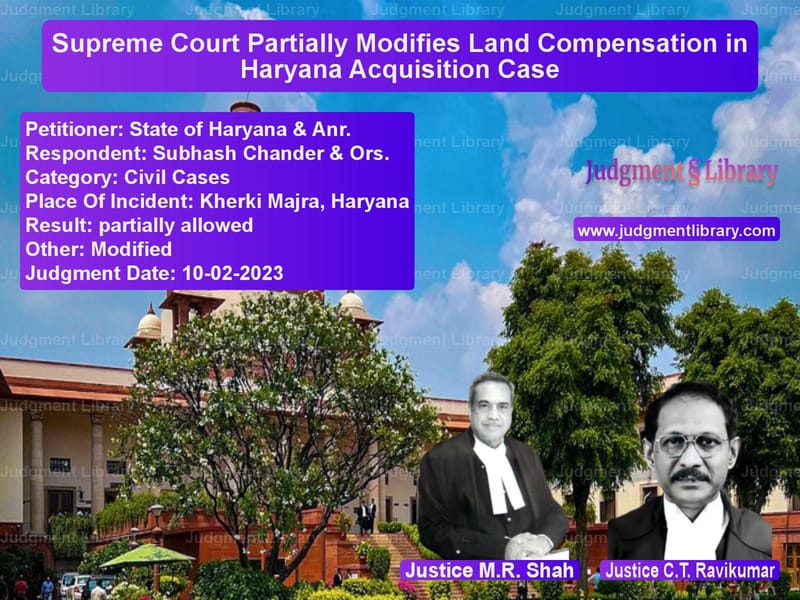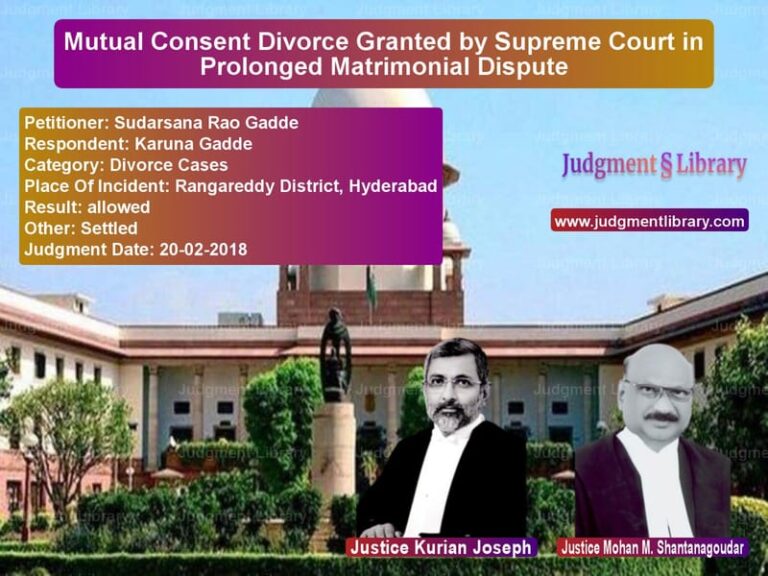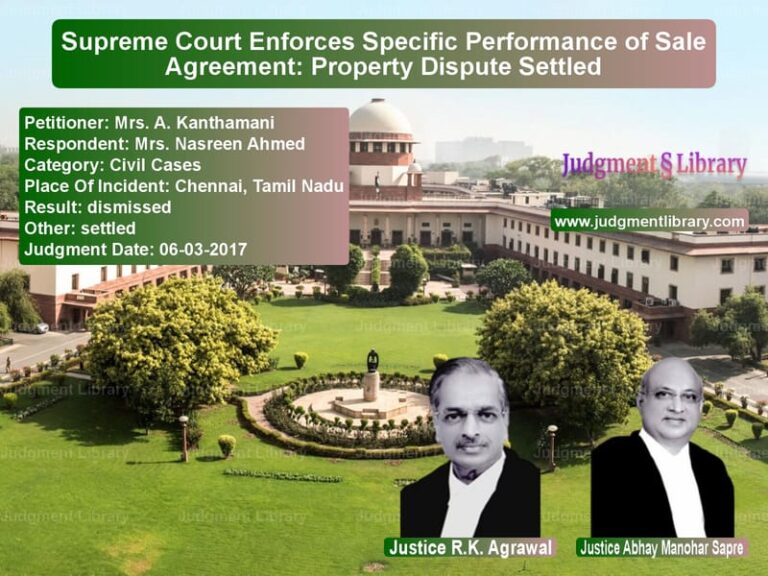Supreme Court Partially Modifies Land Compensation in Haryana Acquisition Case
The Supreme Court of India, in its judgment dated February 10, 2023, ruled on a significant case regarding land compensation in Haryana. The case, State of Haryana & Anr. vs. Subhash Chander & Ors., involved the enhancement of compensation for land acquired by the government under the Land Acquisition Act, 1894. The Court modified the Punjab & Haryana High Court’s order, reducing the compensation rate while ensuring fair market value for landowners.
Background of the Case
The case pertains to the acquisition of approximately 58 acres of land in Kherki Majra village, Haryana, for public purposes. The government had initially awarded compensation of Rs. 60 lakhs per acre, which was later increased by the Reference Court to Rs. 1,56,24,000 per acre under Section 18 of the Land Acquisition Act. However, dissatisfied landowners appealed to the Punjab & Haryana High Court, which further enhanced the compensation to Rs. 2,98,54,720 per acre, applying a 12% increase based on a previous judgment.
The State of Haryana challenged this enhancement before the Supreme Court, arguing that the High Court had erred in applying the 12% increase without concrete evidence of price escalation.
Arguments by the Appellant (State of Haryana)
- The High Court mistakenly relied on a prior judgment, State of Haryana vs. Ram Chander (2017 SCC OnLine SC 1869), which specifically stated that the compensation determined therein should not be treated as a precedent.
- The increase in land prices was not uniform, and the 12% escalation was arbitrarily applied.
- Given that land acquisition in the same village had begun in 2008, the prices had already reached an artificial high.
- Sale instances from 2008 to 2010 showed fluctuations in land prices, challenging the assumption of a continuous rise.
- Applying a 12% increase on Rs. 2,38,00,000 per acre (from the previous case) was excessive and unjustified.
Arguments by the Respondents (Landowners)
- The compensation awarded by the High Court was fair and based on market trends.
- The State failed to provide contrary sale instances proving a decline in land prices.
- Earlier cases, including Ramrao Shankar Tapase vs. Maharashtra Industrial Development Corporation (2022) 7 SCC 563, allowed cumulative increases of 10-15% per year in market value.
- The increase in land prices between 2008 and 2010 justified the High Court’s decision.
Supreme Court’s Observations and Judgment
The Supreme Court modified the High Court’s order, reducing the enhancement rate from 12% to 10%, stating:
“The High Court erred in applying a 12% increase without assessing whether it reflected the actual market conditions. A 10% enhancement, in line with previous rulings, would be more appropriate.”
The Court upheld the principle that land valuation should be evidence-based, rather than assuming automatic yearly increases. The final compensation amount was set at Rs. 2,87,98,000 per acre.
Key Takeaways from the Judgment
- Land valuation must be evidence-based: Courts cannot apply arbitrary increases without substantiating them with market trends.
- Compensation should be fair but not excessive: The ruling balanced landowners’ rights with state interests.
- Prior judgments should not be misused: The Supreme Court reinforced that earlier cases should not serve as automatic precedents for compensation calculations.
Implications of the Judgment
The ruling sets a benchmark for future land acquisition cases, emphasizing that compensation must reflect actual market conditions rather than arbitrary enhancements. It ensures that both landowners and the government receive fair outcomes in acquisition disputes.
Conclusion
The Supreme Court’s decision in this case brings clarity to land compensation laws, ensuring fairness and uniformity in valuation. By revising the High Court’s approach, the Court has reaffirmed that land acquisition policies must be guided by sound economic reasoning rather than assumptions of price escalation. The ruling serves as a guiding principle for future disputes on land valuation in India.
Petitioner Name: State of Haryana & Anr..Respondent Name: Subhash Chander & Ors..Judgment By: Justice M.R. Shah, Justice C.T. Ravikumar.Place Of Incident: Kherki Majra, Haryana.Judgment Date: 10-02-2023.
Don’t miss out on the full details! Download the complete judgment in PDF format below and gain valuable insights instantly!
Download Judgment: state-of-haryana-&-a-vs-subhash-chander-&-or-supreme-court-of-india-judgment-dated-10-02-2023.pdf
Directly Download Judgment: Directly download this Judgment
See all petitions in Property Disputes
See all petitions in Damages and Compensation
See all petitions in Judgment by Mukeshkumar Rasikbhai Shah
See all petitions in Judgment by C.T. Ravikumar
See all petitions in partially allowed
See all petitions in Modified
See all petitions in supreme court of India judgments February 2023
See all petitions in 2023 judgments
See all posts in Civil Cases Category
See all allowed petitions in Civil Cases Category
See all Dismissed petitions in Civil Cases Category
See all partially allowed petitions in Civil Cases Category







